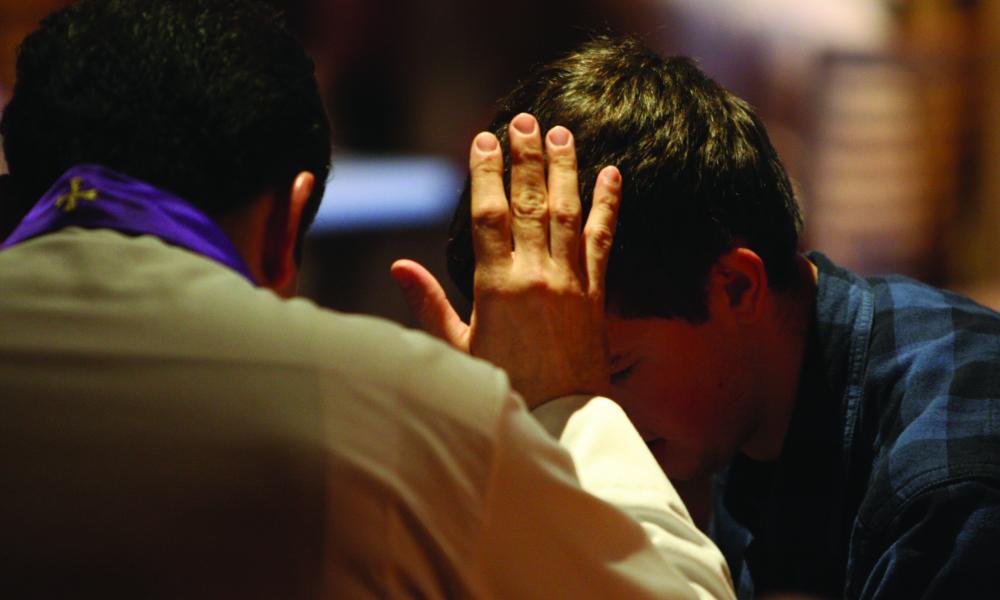
Encountering Jesus in Reconciliation
Sin is never simply personal in its impact. It always has a social consequence as well. It breaks our personal communion with God and, at the same time, it damages our communion with the Church, thereby impacting the body’s communion with her head, Jesus Christ. Consequently, the healing of this rupture requires reconciliation with both God and Christ’s body, the Church.
The sacrament of reconciliation (or penance) liturgically expresses and accomplishes just this. The whole purpose and effect of this sacrament consists in “restoring us to God’s grace and joining us with him in an intimate friendship.” It brings about the “restoration of the dignity and blessings of the life of the children of God.” (CCC 1468) It is a great gift since the sacrament repairs that communion for which we are destined.
A sacrament of healing
The United States Catholic Catechism for Adults indicates that Jesus entrusted the ministry of reconciliation to the Church. In particular, the sacrament of penance is God's gift to us so that any sin committed by us after baptism can be forgiven. In confession, we have the opportunity to repent and recover the grace of friendship with God. It is a holy moment in which we place ourselves in his presence and honestly acknowledge our sins, especially mortal sins.
With absolution, we are reconciled to God and the Church. The sacrament helps us stay close to the truth that we cannot live without God: “In him we live and move and have our being.” (Acts 17:28) While all the sacraments bring us an experience of the mercy that comes from Christ's dying and rising, the sacrament of reconciliation is uniquely and specifically the sacrament of forgiveness.
‘It is in pardoning that we are pardoned.’
However, there is more to this notion of forgiveness as we are taught by Jesus in the words of the Our Father. In this perfect prayer, we encounter the line, “And forgive us our trespasses as we forgive those who trespass against us.”
The catechism (2840) explains the outpouring of God’s mercy “cannot penetrate our hearts as long as we have not forgiven those who have trespassed against us. Love, like the body of Christ, is indivisible; we cannot love the God we cannot see if we do not love the brother or sister we do see. In refusing to forgive our brothers and sisters, our hearts are closed and their hardness makes them impervious to the Father’s merciful love; but in confessing our sins, our hearts are opened to his grace.”
So it is in the same sacrament of reconciliation that we receive both the forgiveness of our sins and the challenge to have the same kind of compassion and forgiveness for those who have sinned against us. In short, we are liberated to be forgivers.
Our heavenly Father knows that it is beyond us to not feel hurts or to forget offenses, so he gives us grace through the sacrament of reconciliation. Again, confessing our sins opens our hearts to this gift of grace through which, as the catechism teaches, “the Holy Spirit turns injury into compassion and purifies the memory in transforming the hurt into intercession.”
Through the sacrament of reconciliation, the Holy Spirit can make our mind the same mind of Jesus Christ. It is our confessing and dying to sin through the gift of God’s grace that allows the “mind of Christ” to well up within us through the power of the Holy Spirit. Only then are we free to forgive as Christ forgives. Only then can we participate in the forgiveness of the Father who does not wait until forgiveness is sought to offer it.
THE SPIRITUAL EFFECTS OF PENANCE OR RECONCILIATION
According to the Catechism of the Catholic Church, the sacrament of penance produces several spiritual effects. Among these effects are:
• the reconciliation of the sinner with God (by which the penitent recovers grace);
• the reconciliation of the sinner with the Church (every sin is social by nature and has an impact of the communion that is the Church with Christ);
• the remission of the eternal punishment incurred by mortal sins and, at least in part, the remission of temporal punishments resulting from sin; peace and serenity of conscience and spiritual consolation;
• an increase of spiritual strength for the Christian battle.
WHY DO WE NEED TO CONFESS OUR SINS TO A PRIEST?
In the Old Testament, the priest was the means, not the source, of God’s forgiveness. This forgiveness reconciled the sinner with both God and the community (see Leviticus 19:20-22). Likewise, in the New Testament, Christ, the one High Priest, the Son of God, exercised his divine power to forgive sins in his own name and reconciled the world through his cross and Resurrection.
The body of Christ, the Church, now shares in this one priesthood of Jesus Christ and is called to be the “sign and instrument” of his forgiveness and reconciliation. When Jesus chose his Apostles to participate in a special way in his priesthood, he imparted to them his own power to forgive sins and granted them the authority to reconcile sinners with the Church (see especially Mt 16:19 and Jn 20:21-23).
The power to “bind and loose” sins (Mt 16:19) extends from the Apostles to their successors, the bishops, and to the priests. Together they forgive sins “in the name of Jesus Christ,” and determine what needs to be done in order to reconcile the sinner with the Church.
The confession of our sins to a priest becomes then an essential part of our reconciliation because it is how God has chosen to extend his forgiveness and reconcile us to himself. It allows us to look at our guilt, take responsibility for it, and open ourselves to God and to communion with the Church.
Doug Culp is the delegate for administration and the secretary for pastoral life for the Catholic Diocese of Lexington.



